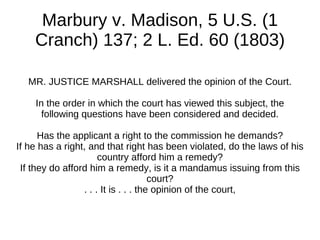Marburyv madison
- 1. Marbury v. Madison, 5 U.S. (1 Cranch) 137; 2 L. Ed. 60 (1803) MR. JUSTICE MARSHALL delivered the opinion of the Court. In the order in which the court has viewed this subject, the following questions have been considered and decided. Has the applicant a right to the commission he demands? If he has a right, and that right has been violated, do the laws of his country afford him a remedy? If they do afford him a remedy, is it a mandamus issuing from this court? . . . It is . . . the opinion of the court,
- 2. Marbury v. Madison, 5 U.S. (1 Cranch) 137; 2 L. Ed. 60 (1803) That, by signing the commission of Mr. Marbury, the President of the United States appointed him a justice of peace, for the county of Washington in the District of Columbia; and that the seal of the United States, affixed thereto by the Secretary of State, is conclusive testimony of the verity of the signature, and of the completion of the appointment; and that the appointment conferred on him a legal right to the office for the space of five years.
- 3. Marbury v. Madison, 5 U.S. (1 Cranch) 137; 2 L. Ed. 60 (1803) He is entitled to the remedy for which applies. This depends on, The nature of the writ applied for and The power of this court. . . . This, then, is a plain case for mandamus, either to deliver the commission, or a copy of it from the record; and it only remains to be enquired, whether it can issue from this court.
- 4. Marbury v. Madison, 5 U.S. (1 Cranch) 137; 2 L. Ed. 60 (1803) The Secretary of State, being a person holding an office under the authority of the United States, is precisely within the letter of the description and if this court is not authorized to issue a writ of mandamus to such an officer, it must be because the law is unconstitutional, and therefore absolutely incapable of conferring the authority, and assigning the duties which its words purport to confer and assign. The Constitution vests the whole judicial power of
- 5. Marbury v. Madison, 5 U.S. (1 Cranch) 137; 2 L. Ed. 60 (1803) If it had been intended to leave it in the discretion of the legislature to apportion the judicial power between the Supreme and inferior courts according to the will of that body, it would certainly have been useless to have proceeded further than to have defined the judicial power, and the tribunals in which it should be vested. The subsequent part of the section is mere surplusage, is entirely without meaning. If Congress remains at liberty to give this court appellate jurisdiction, where the Constitution
- 6. Marbury v. Madison, 5 U.S. (1 Cranch) 137; 2 L. Ed. 60 (1803) It is the essential criterion of appellate jurisdiction that it revises and corrects the proceedings in a cause already instituted, and does not create that cause. Although, therefore, a mandamus may be directed to courts, yet to issue such a writ to an officer for the delivery of a paper is in effect the same as to sustain an original action for that paper, and, therefore, seems not to belong to appellate, but to original jurisdiction. Neither is it necessary, in such a case as this, to enable the court to exercise its appellate
- 7. Marbury v. Madison, 5 U.S. (1 Cranch) 137; 2 L. Ed. 60 (1803) This original and supreme will organizes the government, and assigns to different departments their respective powers. It may either stop here, or establish certain limits not to be transcended by those departments. The government of the United States is of the latter description. The powers of the legislature are defined and limited; and that those limits may not be mistaken, or forgotten, the Constitution is written. To what purpose are
- 8. Marbury v. Madison, 5 U.S. (1 Cranch) 137; 2 L. Ed. 60 (1803) If an act of the legislature, repugnant to the Constitution, is void, does it, notwithstanding its invalidity, bind the courts, and oblige them to give it effect? Or, in other words, though it be not law, does it constitute a rule as operative as if it was a law? This would be to overthrow in fact what was established in theory; and would seem at first view, an absurdity too gross to be insisted on. It shall, however, receive a more attentive consideration.
- 9. Marbury v. Madison, 5 U.S. (1 Cranch) 137; 2 L. Ed. 60 (1803) This doctrine would subvert the very foundation of all written constitutions. It would declare that an act which, according to the principles and theory of our government, is entirely void, is yet, in practice, completely obligatory. It would declare that if the legislature shall do what is expressly forbidden, such act, notwithstanding the express prohibition, is in reality effectual. It would be giving to the legislature a practical and real omnipotence, with the same breath which professes to restrict their powers within
- 10. Marbury v. Madison, 5 U.S. (1 Cranch) 137; 2 L. Ed. 60 (1803) For more goto: http://constitution.org/ussc/005-137a.htm










